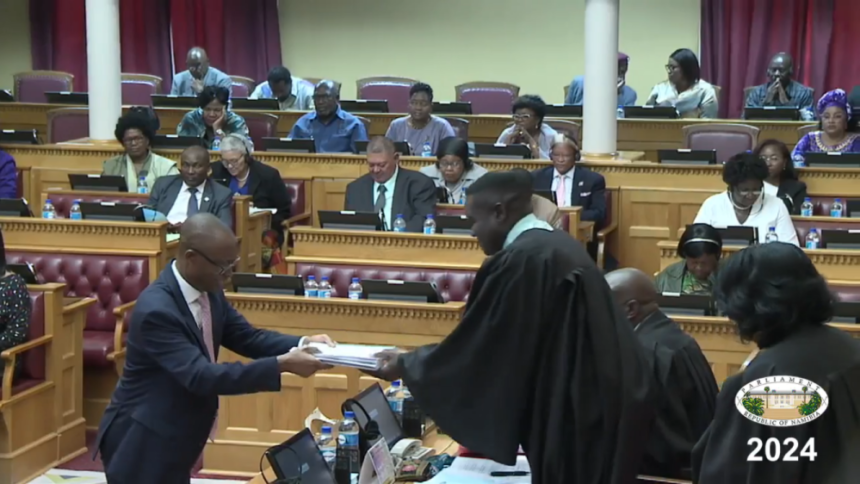Staff Reporter
FINANCE Minister Iipumbu Shiimi, in his Mid-Year Budget Review on Wednesday, announced an increase in the operational budget for the Financial Year 2024/25 by N$2.6 billion to a total of N$78.2 billion. The development budget has decreased to N$10.4 billion, while debt servicing costs remain unchanged at N$12.9 billion.
Despite these adjustments, the initial ceilings of most expenditure votes were left unchanged. Shiimi said the low implementation rate during the first half of the year, stating that various ministries have sufficient funding to fulfil their mandates and meet government policy priorities for the year.
“As such,” he said, “we have encouraged the votes to reallocate funds within their existing ceilings to address other urgent operational expenditures that could not benefit from additional allocations.”
He added that with these changes, the nominal budget deficit will decline marginally by N$277.3 million to N$8.7 billion, while remaining steady as a ratio of GDP at 3.2 percent. “Accordingly, we will adjust the borrowing plan for the remaining months of the financial year as necessary,” he said.
In February, Shiimi tabled the main budget of N$100.1 billion, consisting of N$74.6 billion in operational expenditure, N$12.8 billion in development expenditure (of which N$3.2 billion was for projects to be funded outside of the State Revenue Fund), and N$12.8 billion in interest payments.
He said that the Mid-Year Budget Review process provides an opportunity to enhance the effectiveness of resource allocation by taking stock of the collective implementation of the National Budget thus far and making requisite adjustments to meet unforeseen emergencies and stay on track to attain annual priorities.
Shiimi announced a reallocation of resources affecting several capital projects, primarily in the railway sector. However, given the importance of the rail sector in unlocking economic activities, he assured that sufficient funding would still be allocated to ensure the upgrading and development of the railway network.
“Furthermore,” he said, “we will work closely with the Ministry of Works and Transport and TransNamib to expedite the upgrading of the national railway network.”
During consultations for the Mid-Year Budget Review, additional expenditure requests totaling N$8.3 billion were received for consideration. However, only an additional N$3.6 billion was allocated after balancing the requests against available resources, in line with fiscal sustainability and the need to manage borrowing requirements.
The FY2024/25 Appropriation Amendment Bill provides for an additional N$698.8 million for drought relief and N$139.0 million for extending the N$600 monthly Conditional Basic Income Grant (CBIG). A total of N$1.1 billion has been added to the goods and services budgets of various votes, including N$450 million for the Ministry of Health and Social Services to address various emergencies in the sector; N$233.0 million for summer cropping at the Green Schemes; N$200.0 million to supplement the Electoral Commission of Namibia (ECN) budget; N$187.8 million for hostel catering and utilities for the Ministry of Education, Arts and Culture; N$140.0 million to cover utilities for the Ministry of Defence and Veterans Affairs; and N$86.8 million to address foreign exchange rate fluctuations for the Ministry of International Relations and Cooperation due to overspending in the previous year.
An amount of N$2.4 billion has been allocated to subsidies and other transfers to government organizations, including N$500 million to cover projected shortfalls for the Public Service Employees Medical Scheme (PSEMAS), N$386.0 million for the University of Namibia to cover its operational expenses, N$187.8 million to supplement the contingency budget, N$88.0 million to address shortfalls in student funding at the Namibia Student Financial Assistance Fund (NSFAF), and N$40.0 million to absorb the suspended electricity tariff increase by the Electricity Control Board (ECB).


